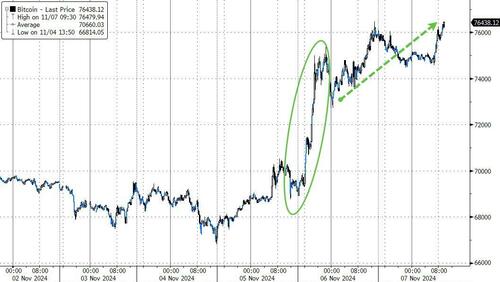
Authored by Michael Johnson via Evergreen Gavekal blog,
Cryptocurrencies have undergone an astonishing evolution over the past 15 years.
What began with Bitcoin’s (BTC) launch in January 2009 has grown into a dynamic yet highly volatile asset class, capturing the attention of individual investors, financial institutions, and governments worldwide.
Bitcoin, often referred to as “digital gold,” has generated phenomenal, unprecedented returns for early adopters, as shown in the chart below. However, despite this dramatic ascent, the cryptocurrency market remains a speculative and often misunderstood corner of the financial world. Wild price swings, regulatory concerns, and complex underlying technology make cryptocurrencies both exciting and risky.
In the lead-up to Tuesday's Presidential election, investors closely watched market movements, with some speculating that a victory by former President Donald Trump could act as a catalyst for crypto prices. For crypto enthusiasts, the election results did not disappoint. Bitcoin’s price surged nearly 8% in early trading, crossing the $75,000 mark for the first time and breaking its previous all-time high set in March. Other cryptocurrencies followed suit; Dogecoin, for example, saw significant gains, partly due to its association with its most notable supporter, Elon Musk. Musk’s frequent endorsements of Dogecoin have fueled its popularity, despite its origins as a “joke” cryptocurrency.
The recent price jumps following the election raise two crucial questions:
1. Is the Price Jump in Cryptocurrencies a Knee-Jerk Reaction or Sustainable Momentum?
History has shown that cryptocurrency markets often react to macroeconomic and political events, with sharp price increases or decreases around significant news.
In this case, the election results have likely fueled short-term speculative buying. When large investors and traders anticipate a favorable outcome, they can inject a wave of capital into the market, driving up prices. However, the long-term sustainability of this momentum is less certain and depends on multiple factors, such as post-election regulatory policies, interest rates, and investor confidence in the broader economy.
Many analysts argue that Bitcoin and other digital assets are increasingly viewed as a hedge against inflation and economic instability, much like gold. If this narrative continues to hold, these assets may find more sustained support from both retail and institutional investors, especially if inflation remains high or the economic landscape is uncertain. Additionally, the cryptocurrency market will almost certainly benefit if support from the new administration remains strong.
2. Does a Change in Administration Provide Tailwinds to Cryptocurrencies?
Shifts in political leadership often influence regulatory landscapes, which could, in turn, affect the future of the cryptocurrency market. President-elect Trump has signaled his support for the industry, declaring his affection for the digital currency on several occasions. Additionally, he has promised to remove existing SEC leadership leading the US government’s crackdown on the crypto industry.
On Tuesday night, Coinbase CEO, Brian Armstrong, offered his perspective on what the change in leadership means for the industry: “Tonight the crypto voter has spoken decisively — across party lines and in key races across the country. Americans disproportionately care about crypto and want clear rules of the road for digital assets. We look forward to working with the new Congress to deliver it.”
Many governments continue to explore central bank digital currencies (CBDCs), which could bring legitimacy to digital assets while also create regulatory competition for cryptocurrencies. Should the U.S. choose to advance its own CBDC initiatives, there could be an indirect benefit to the crypto space by fostering broader digital asset literacy and infrastructure improvements.
Looking Ahead: What’s Next for Cryptocurrencies?
The cryptocurrency market remains unpredictable, and investors should remain cautious.
While speculative rallies provide opportunities for quick gains, the risk of rapid declines is ever-present.
Moving forward, the path will likely be shaped by a combination of policy changes, economic conditions, and technological developments.
For those who embrace the potential of digital currencies, this election-induced rally serves as a reminder of both the opportunities and the risks inherent in this asset class.
Whether Bitcoin and other cryptocurrencies can sustain their momentum, or if they will once again face turbulence from political and economic shifts, remains an open question.
However, the increasing integration of these assets into mainstream finance suggests that cryptocurrencies are evolving from a speculative fringe to a central component of the modern financial landscape.
Authored by Michael Johnson via Evergreen Gavekal blog,
Cryptocurrencies have undergone an astonishing evolution over the past 15 years.
What began with Bitcoin’s (BTC) launch in January 2009 has grown into a dynamic yet highly volatile asset class, capturing the attention of individual investors, financial institutions, and governments worldwide.
Bitcoin, often referred to as “digital gold,” has generated phenomenal, unprecedented returns for early adopters, as shown in the chart below. However, despite this dramatic ascent, the cryptocurrency market remains a speculative and often misunderstood corner of the financial world. Wild price swings, regulatory concerns, and complex underlying technology make cryptocurrencies both exciting and risky.
In the lead-up to Tuesday’s Presidential election, investors closely watched market movements, with some speculating that a victory by former President Donald Trump could act as a catalyst for crypto prices. For crypto enthusiasts, the election results did not disappoint. Bitcoin’s price surged nearly 8% in early trading, crossing the $75,000 mark for the first time and breaking its previous all-time high set in March. Other cryptocurrencies followed suit; Dogecoin, for example, saw significant gains, partly due to its association with its most notable supporter, Elon Musk. Musk’s frequent endorsements of Dogecoin have fueled its popularity, despite its origins as a “joke” cryptocurrency.
The recent price jumps following the election raise two crucial questions:
1. Is the Price Jump in Cryptocurrencies a Knee-Jerk Reaction or Sustainable Momentum?
History has shown that cryptocurrency markets often react to macroeconomic and political events, with sharp price increases or decreases around significant news.
In this case, the election results have likely fueled short-term speculative buying. When large investors and traders anticipate a favorable outcome, they can inject a wave of capital into the market, driving up prices. However, the long-term sustainability of this momentum is less certain and depends on multiple factors, such as post-election regulatory policies, interest rates, and investor confidence in the broader economy.
Many analysts argue that Bitcoin and other digital assets are increasingly viewed as a hedge against inflation and economic instability, much like gold. If this narrative continues to hold, these assets may find more sustained support from both retail and institutional investors, especially if inflation remains high or the economic landscape is uncertain. Additionally, the cryptocurrency market will almost certainly benefit if support from the new administration remains strong.
2. Does a Change in Administration Provide Tailwinds to Cryptocurrencies?
Shifts in political leadership often influence regulatory landscapes, which could, in turn, affect the future of the cryptocurrency market. President-elect Trump has signaled his support for the industry, declaring his affection for the digital currency on several occasions. Additionally, he has promised to remove existing SEC leadership leading the US government’s crackdown on the crypto industry.
On Tuesday night, Coinbase CEO, Brian Armstrong, offered his perspective on what the change in leadership means for the industry: “Tonight the crypto voter has spoken decisively — across party lines and in key races across the country. Americans disproportionately care about crypto and want clear rules of the road for digital assets. We look forward to working with the new Congress to deliver it.”
Many governments continue to explore central bank digital currencies (CBDCs), which could bring legitimacy to digital assets while also create regulatory competition for cryptocurrencies. Should the U.S. choose to advance its own CBDC initiatives, there could be an indirect benefit to the crypto space by fostering broader digital asset literacy and infrastructure improvements.
Looking Ahead: What’s Next for Cryptocurrencies?
The cryptocurrency market remains unpredictable, and investors should remain cautious.
While speculative rallies provide opportunities for quick gains, the risk of rapid declines is ever-present.
Moving forward, the path will likely be shaped by a combination of policy changes, economic conditions, and technological developments.
For those who embrace the potential of digital currencies, this election-induced rally serves as a reminder of both the opportunities and the risks inherent in this asset class.
Whether Bitcoin and other cryptocurrencies can sustain their momentum, or if they will once again face turbulence from political and economic shifts, remains an open question.
However, the increasing integration of these assets into mainstream finance suggests that cryptocurrencies are evolving from a speculative fringe to a central component of the modern financial landscape.
Loading…





